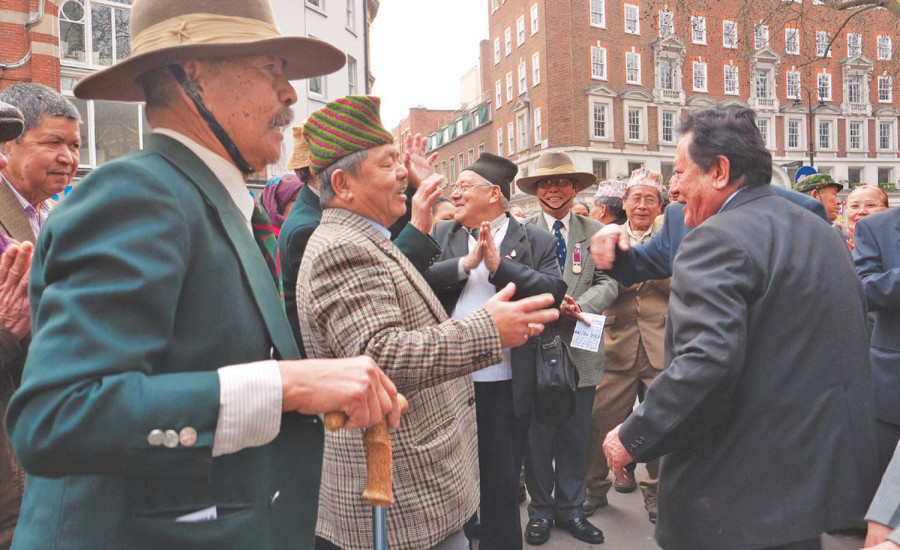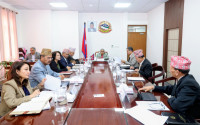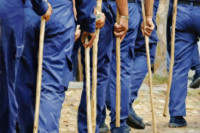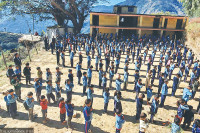National
Ex-Gurkha soldiers’ fight for justice to continue with tripartite talks
The 1947 deal between Nepal, Britain and India outlines equal pay, pension and perks for Nepalis in the forces.
Anil Giri
The long-awaited tripartite talks for equal pension and benefits for retired Gurkha soldiers is scheduled to take place in London on November 3, according to leaders of the agitating Gurkha veterans.
The tripartite talks are to be held at the Ministry of Defence and will be attended by the representatives of the government of Nepal, the Gurkha veterans and the British government.
Gyan Chandra Acharya, Nepal’s ambassador to the United Kingdom, will represent the government while Major Juddha Bahadur Gurung, Dhan Bahadur Gurung and Pushpa Rana Ghale will represent the agitating Gurkha community. There is no official confirmation yet on who will represent the British side.
“We are excited, but nervous too, as the British side had until recently tried to stay away from providing equal pay, pension and other benefits to us, particularly those who retired before 2006,” Krishna Ruchhenbung Rai, who is leading the campaign for justice and equality for Gurkha veterans, told the Post over the phone from London.
According to Rai, the British government—which had earlier dismissed their claim seeking equal pension and pay for those who had retired or had been made redundant by the British Army before 2006—has been saying they will now only reconsider their welfare and medical benefits.
Seeking equal pay, pension and perks as provided to the British nationals, three Gurkha veterans staged a hunger strike in August last year. After the strike, the British side agreed to sit for talks.
But the tripartite talks were delayed due to frequent political changes in the United Kingdom. The 1947 tripartite agreement between Nepal, British and Indian governments had clearly outlined equal pay, pension and perks for Nepali youths in the Indian and British armies.
The agreement had also paved the way for the distribution between India and Britain of existing Gurkha brigades serving in British India. Thus, the 2nd, 6th, 7th and 10th Gurkha Rifles became part of the British Army, while the remaining brigades were retained by an independent India.
The tripartite pact assures that all perks, remuneration, benefits and pension schemes for Nepalis serving in the British and Indian armies will be equal to those of British and Indian nationals. However, Gurkha veterans have long alleged that Britain has pursued discriminatory policies in remuneration.
On March 20, 2017, the British government had agreed to form a panel to study the demands of retired Gurkha army personnel, including pension. The panel submitted its report to the governments of Nepal and Britain on March 22, 2018.
Again, in 2018, the Nepali Embassy in London, representatives of the Gurkha community and the British government prepared a tripartite report and the outline for talks among the three sides in order to settle the issue, permanently.
The report suggested that both governments form a committee for dialogue between Nepal and the British governments to address the demands of the British ex-Gurkha veterans for equal pension.
Apart from equal pension rights, the Gurkha veterans have also been demanding equal pay and perks, free healthcare and equal compensations, residency for family members of Gurkha soldiers and equal pension to the widows of Gurkha soldiers who died during service.
Although the Gurkhas who retired after 2007 are getting pension and other perks on par with their British counterparts, the problem is with regard to the more than 8,000 Gurkhas who retired before 2007. The disparity and difference is more than 300 percent, according to Gurkha Satyagraha United Struggle Committee, which is leading the campaign.
As things stand, the British side has time and again communicated to the Nepali authorities that giving equal perks and pension to former Gurkha soldiers would bring a huge financial burden on the British government.
According to the Gurkha Satyagraha United Struggle Committee, more than 25,000 pensioners who retired before July 1, 2007 were deprived of equal pension. However, that number has since come down to around 8,000 as the others have died.
Meanwhile, ambassador Acharya, confirming the date of the tripartite talks to the Post, said that there is still no clarity on the views of the British government.
“There are several issues associated with the Gurkha veterans. We will get a sense of the British position when a couple of rounds of talks have been completed. It is a negotiation and we do not know how much time it will take,” said Acharya over the phone.
In March 2019, the British government had announced an increase in pension by up to 34 percent for the Brigade of Gurkha servicemen who had joined before 2007. However, that decision was rejected by the Gurkha veterans, who called it a “piecemeal approach” that was not on par with the British nationals.
Rai said that after 207 years of discrimination and injustice to the Gurkha veterans, talks on the issue are now being held in London. But he doubts that the British government will easily address their demands.
“We have asked the Gurkha veterans community, their families and relatives to come together on November 3 in London to show unity and solidarity for our struggle,” he added. “This is the problem of the government of Nepal and the Nepali people. So, we have urged thousands of Nepalis living across the United Kingdom to assemble at Trafalgar Square to press the British government to heed our demands”.
Other Gurkha veterans too remain doubtful about the outcome of the tripartite talks.
“They [the British] are not in a mood to raise the issue of equal pension and pay for those who had faced discrimination in the British Army even after serving for decades,” said SB Ghising, general secretary of the Gurkhas Joint Satyagraha Struggle Committee.
He said the British government seems intent on providing only welfare and medical benefits to the retired Gurkhas. “One round of preliminary talks were held on September 22 in London, which the British side skipped, to raise the issue of equal pension and pay. They did not want to touch on this issue. They want to focus on providing medical and other welfare-related benefits to the retired veterans, mostly living in the United Kingdom and Nepal. This is unacceptable to us.”
“[But] we very much stand on our core demands and until these are met, we will keep fighting,” Ghising added.




 8.71°C Kathmandu
8.71°C Kathmandu














